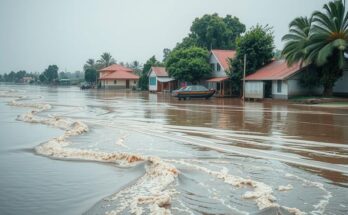A recent study highlights that climate change has exacerbated Hurricane Helene’s impact, increasing its rainfall by 10% and wind speeds by 11%, with similar effects anticipated for Hurricane Milton. The findings underscore the urgent need to address fossil fuel consumption to mitigate future hurricane intensities and resultant flooding.
Recent analysis has revealed that climate change has significantly intensified the impact of Hurricane Helene, increasing its rainfall by approximately 10% and its wind speeds by about 11%. This conclusion is part of a rapid study conducted by scientists from World Weather Attribution (WWA), released as Hurricane Milton approaches the Florida coastline shortly after Helene’s devastation. The warming climate has led to Helene’s wind speeds surging by approximately 13 miles per hour, facilitated by high sea temperatures that were 200 to 500 times more likely due to climate change, with Gulf of Mexico temperatures soaring 3.6 degrees Fahrenheit above average. Ben Clarke, a climate researcher at Imperial College London, stated, “Hurricane Helene and the storms that were happening in the region anyway have all been amplified by the fact that the air is warmer and can hold more moisture…” This alteration means that the rainfall amounts were significantly exacerbated by climate change, leading to catastrophic results to both coastal and inland areas. With over 230 lives lost and massive flooding creating a detrimental aftermath, Helene has been labeled the deadliest hurricane on the U.S. mainland since Hurricane Katrina. Furthermore, scientists anticipate that Hurricane Milton may undergo similar intensification effects. The research emphasizes that continued fossil fuel consumption contributes significantly to a greater frequency of hurricanes akin to Helene, and exacerbates the potential for severe flooding inland, where many fatalities occurred previously due to excessive rainfall. Helene caused unprecedented rainfall, estimated to exceed 40 trillion gallons, resulting in far-reaching destruction across states such as Georgia, the Carolinas, Tennessee, and Virginia. The scientists also noted an increase in the anticipated frequency of hurricanes of this magnitude, now expected approximately every 52 years rather than every 130 years. Although not peer-reviewed, WWA’s methods and conclusions draw from established scientific analysis of weather data and climate models. A separate evaluation by scientists at Lawrence Berkeley National Lab corroborated these findings, noting that climate change has increased rainfall in certain affected regions by 50%, with some areas experiencing up to 20 times more likely rainfall attributable to global warming. Kim Cobb, director of the Institute at Brown for Environment and Society, remarked that while there remain uncertainties about the exact impacts of climate change on storm intensity, it is clear that its effects are increasing the severity and destructive potential of such hurricanes. She suggested that Helene and Milton serve as critical reminders for heightened emergency preparedness and resilience planning.
The discussion surrounding climate change and its impacts on extreme weather events is becoming increasingly critical in light of recent hurricane activity. The link between human-induced climate change and the intensification of hurricanes, such as Helene and Milton, has prompted scientific investigations to discern the extent of this relationship. Hurricanes are projected to become more frequent and severe as global temperatures rise, warranting urgent attention to this pressing issue. Understanding the causative factors, such as elevated sea temperatures and atmospheric changes, is essential for predicting future weather events and formulating responsive measures to mitigate their impact.
In summary, the analysis of Hurricane Helene reveals a concerning trend of climate change contributing to the increasing severity of hurricanes. The findings indicate that climate-warming effects have bolstered both rainfall and wind speeds, resulting in devastating impacts and signaling an urgent need to address fossil fuel dependency. As Hurricane Milton threatens to follow a similar path, it is imperative for society to prioritize effective climate action and preparedness plans to counteract the escalating risks presented by changing climate conditions.
Original Source: www.detroitnews.com




